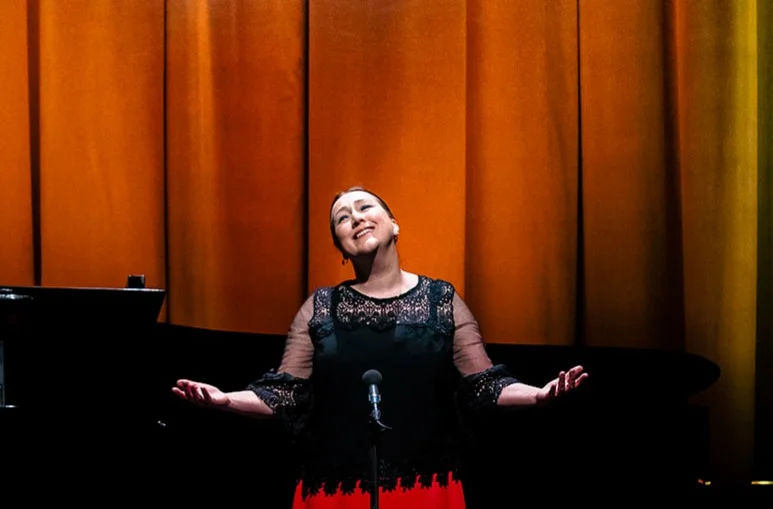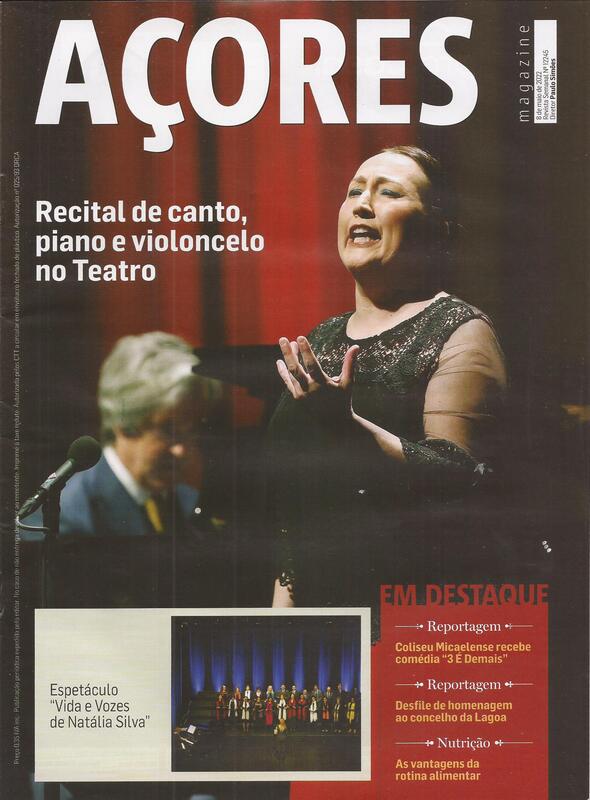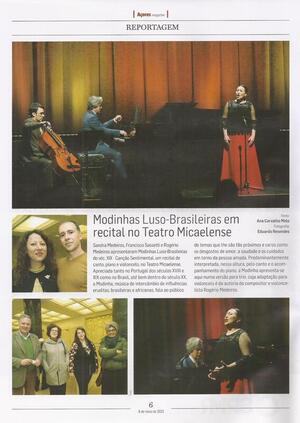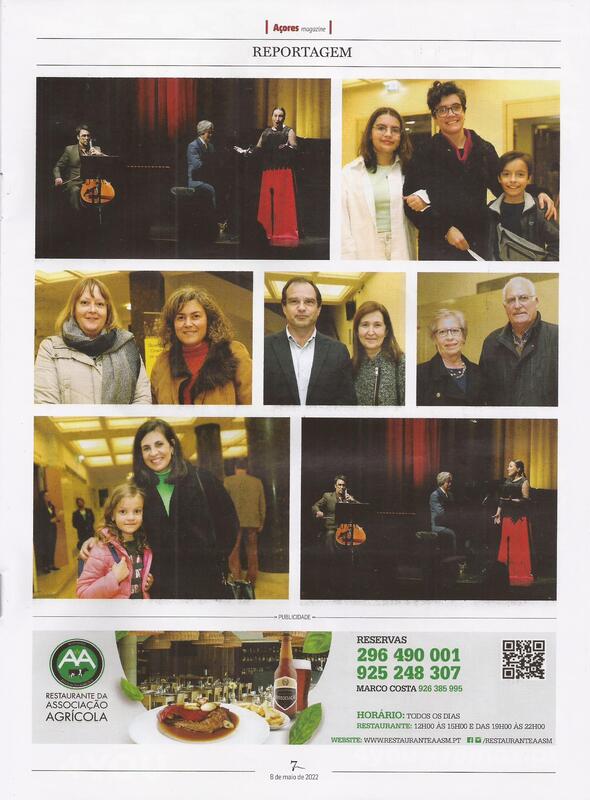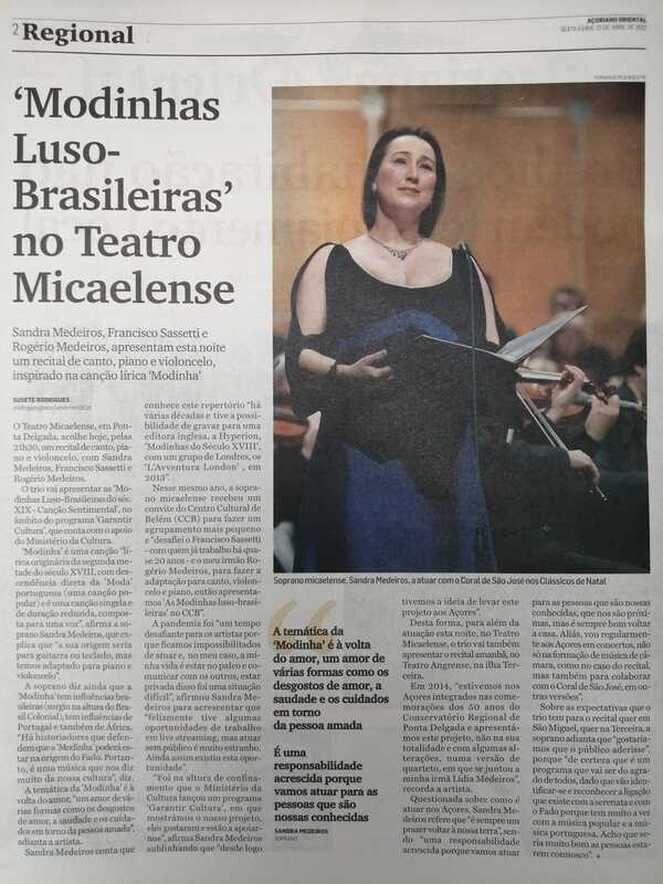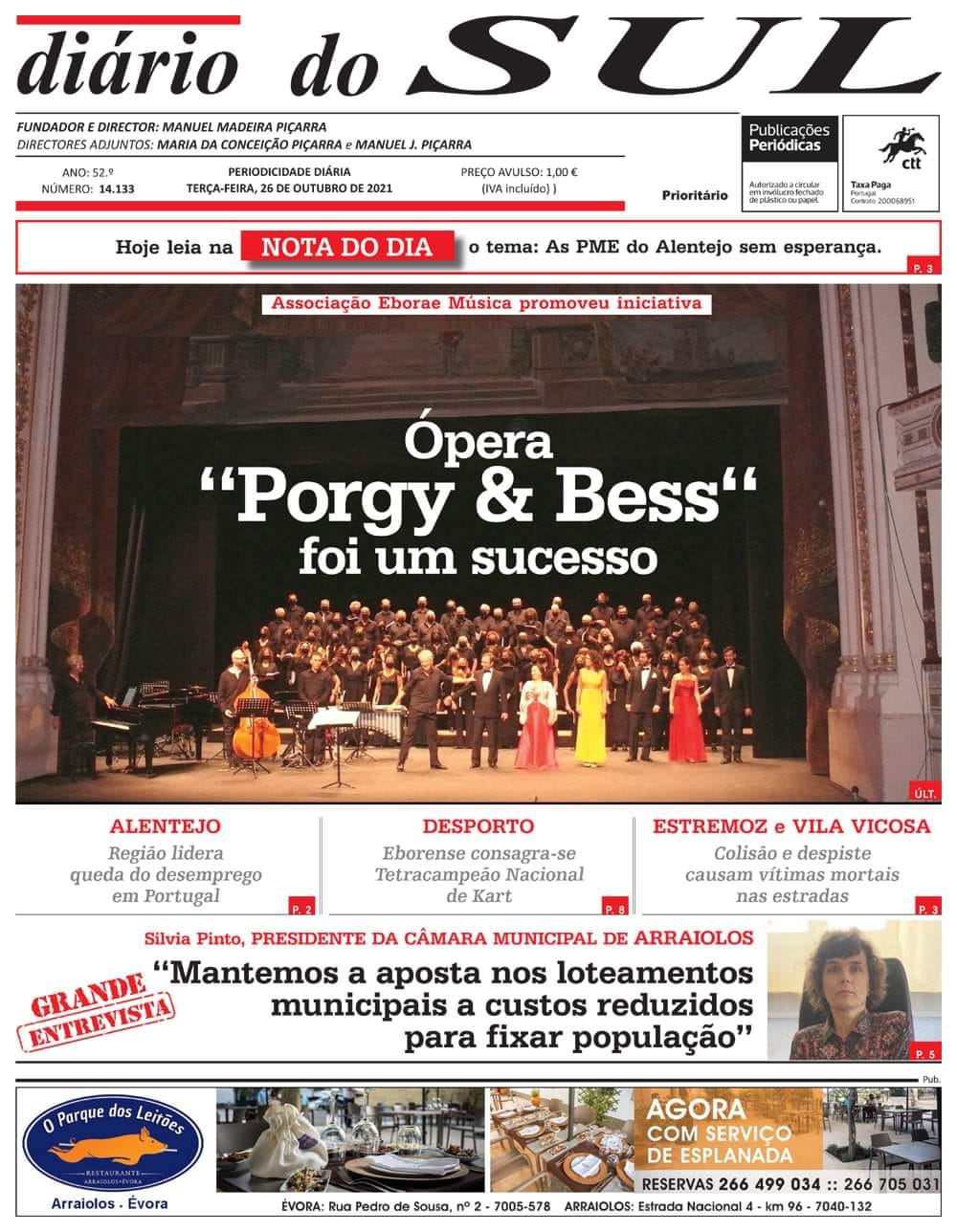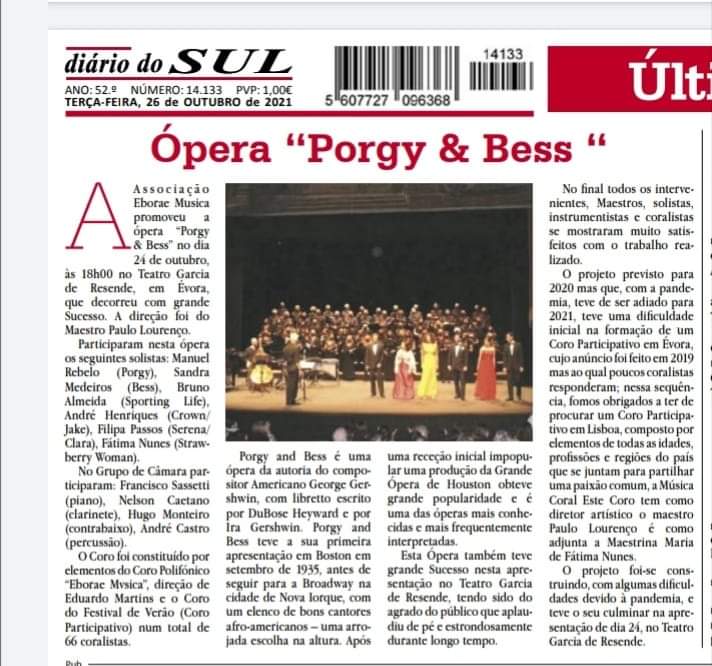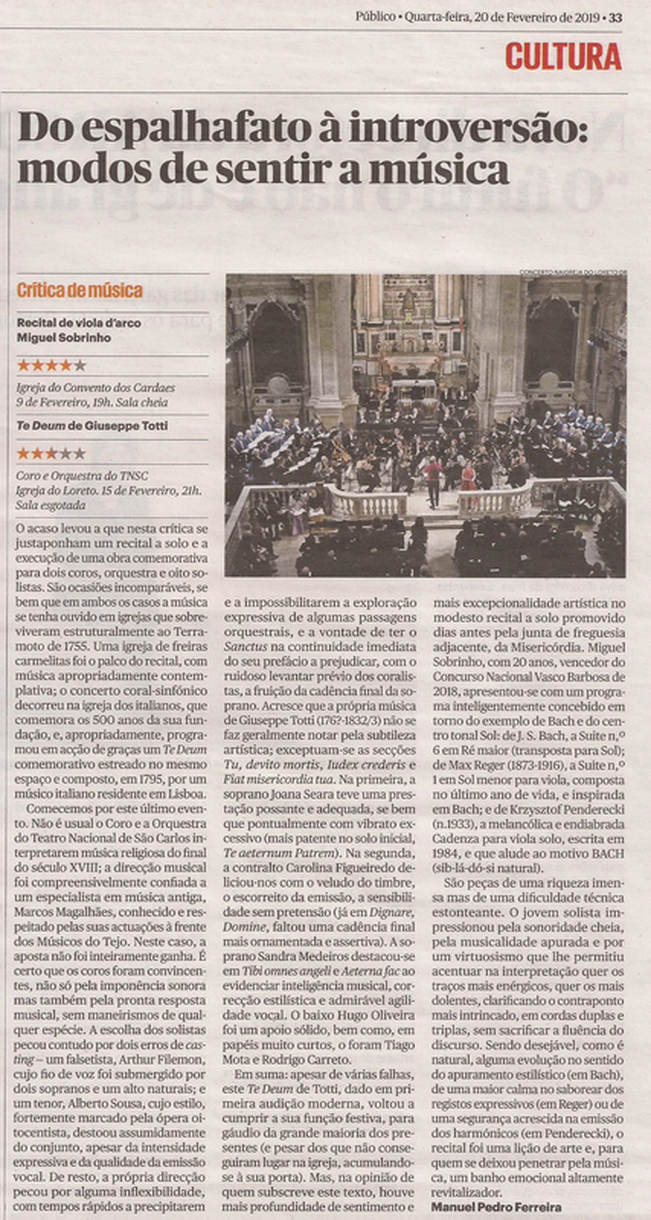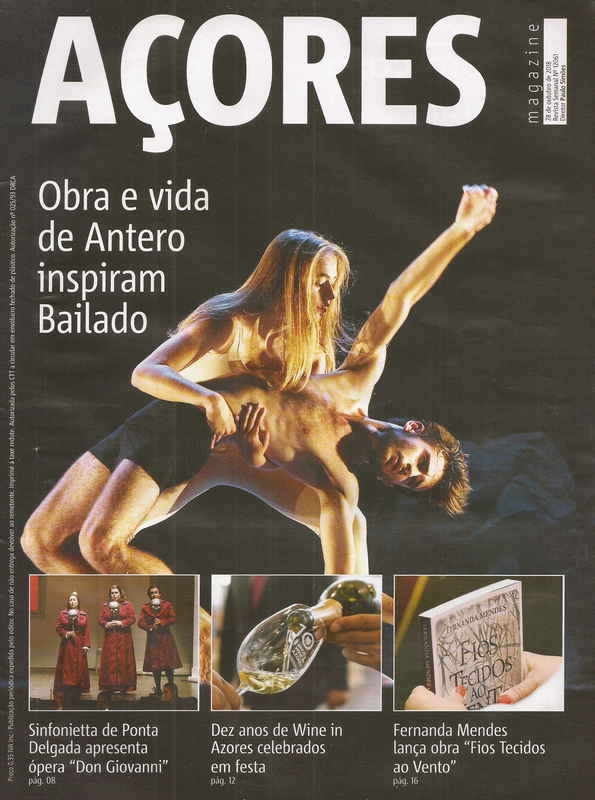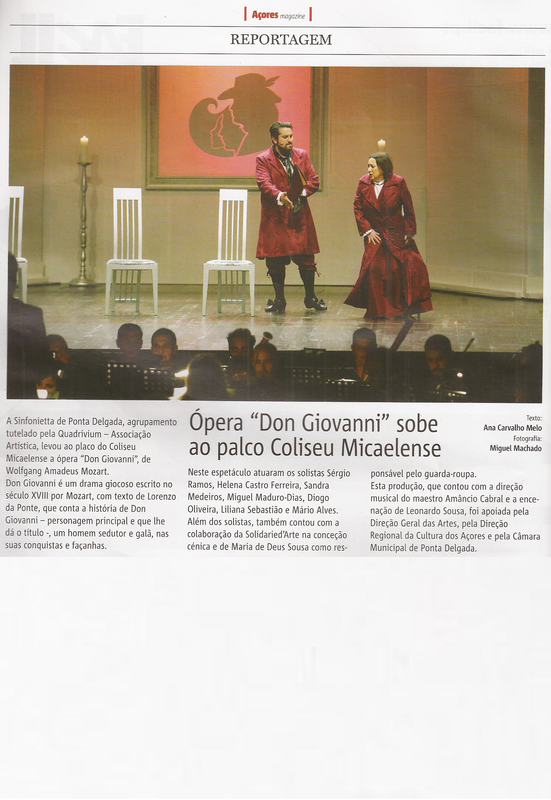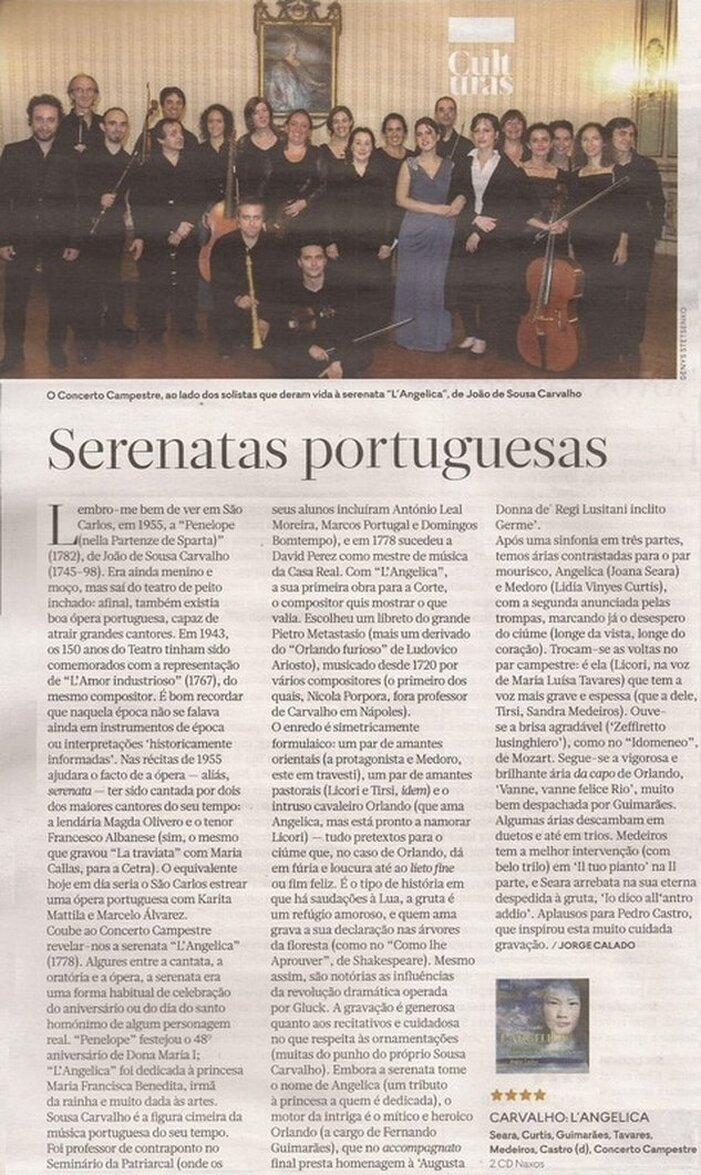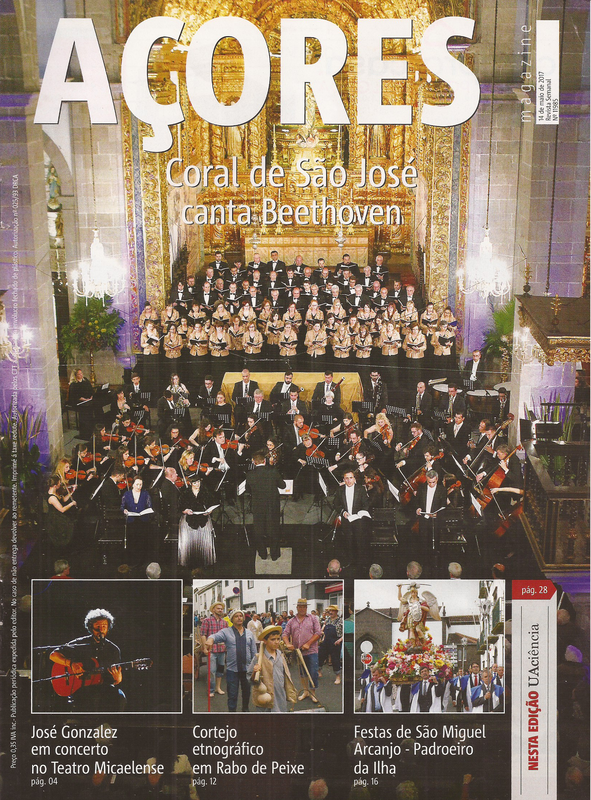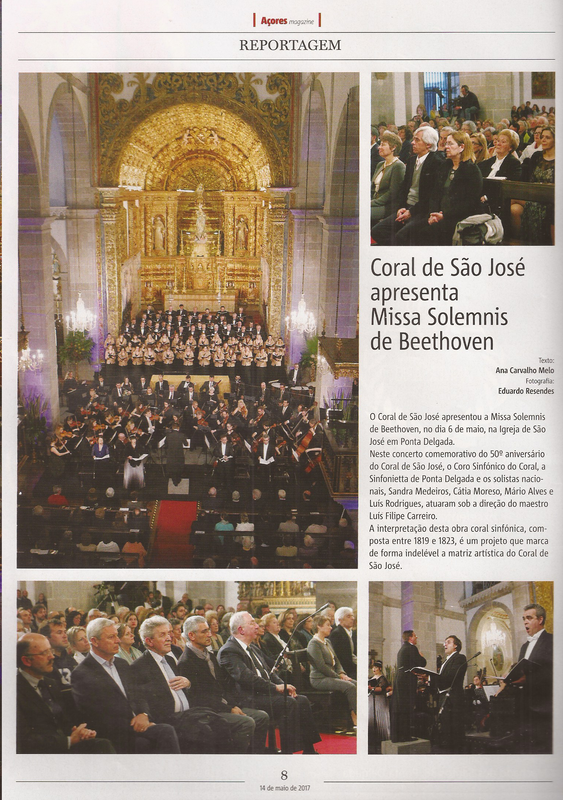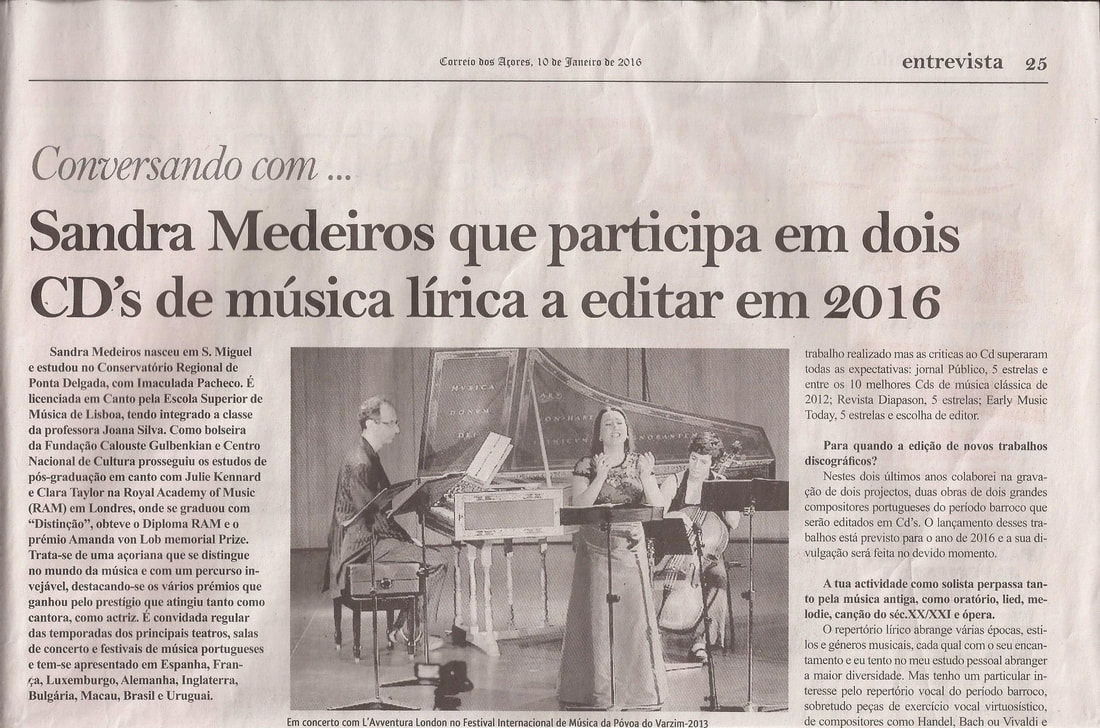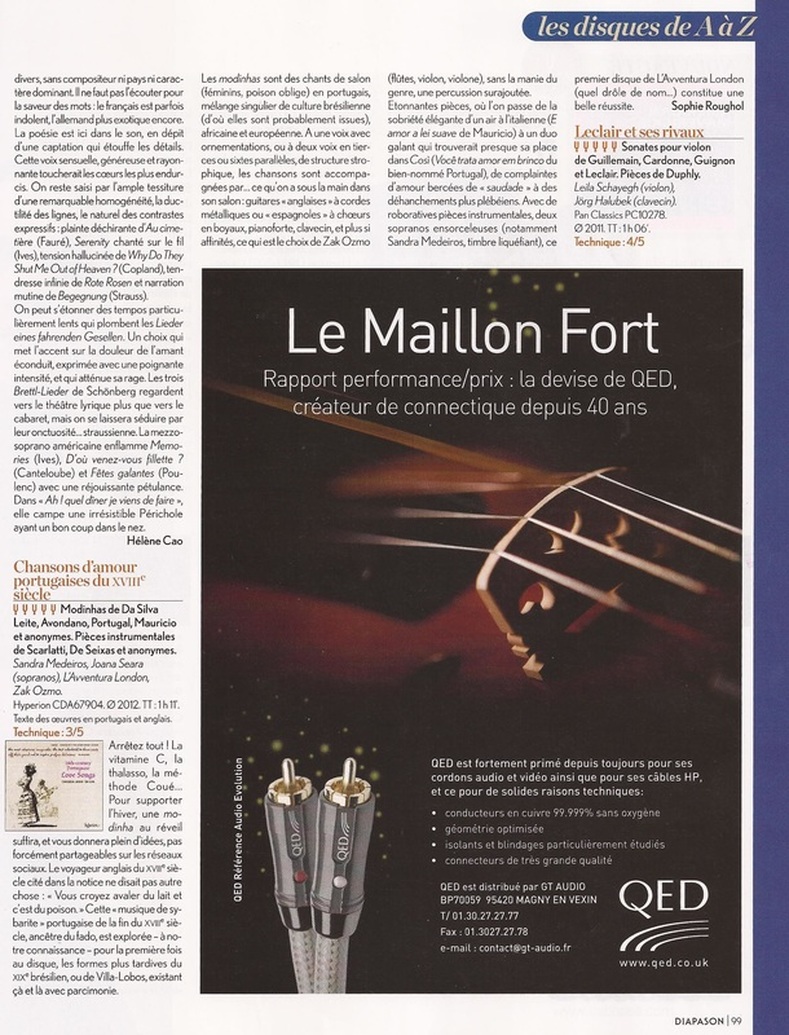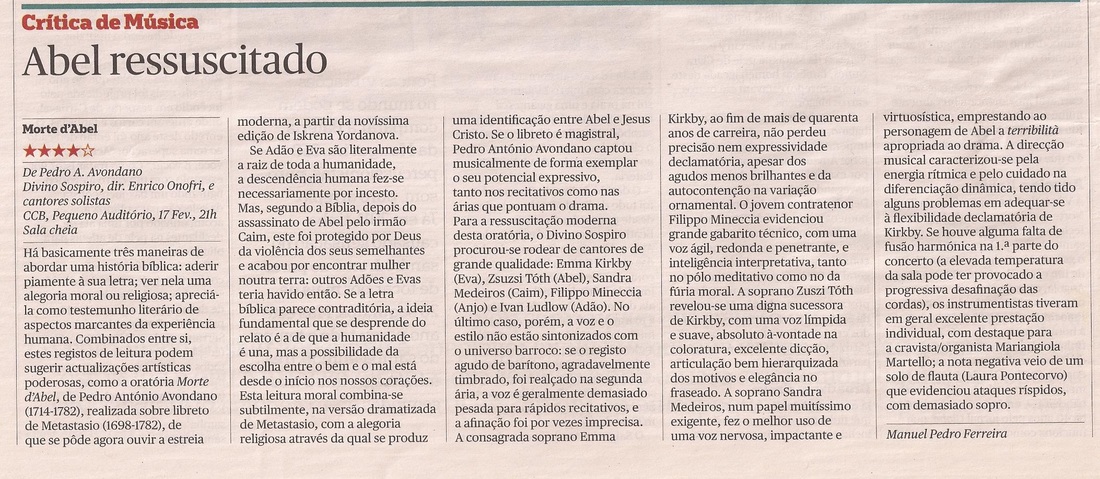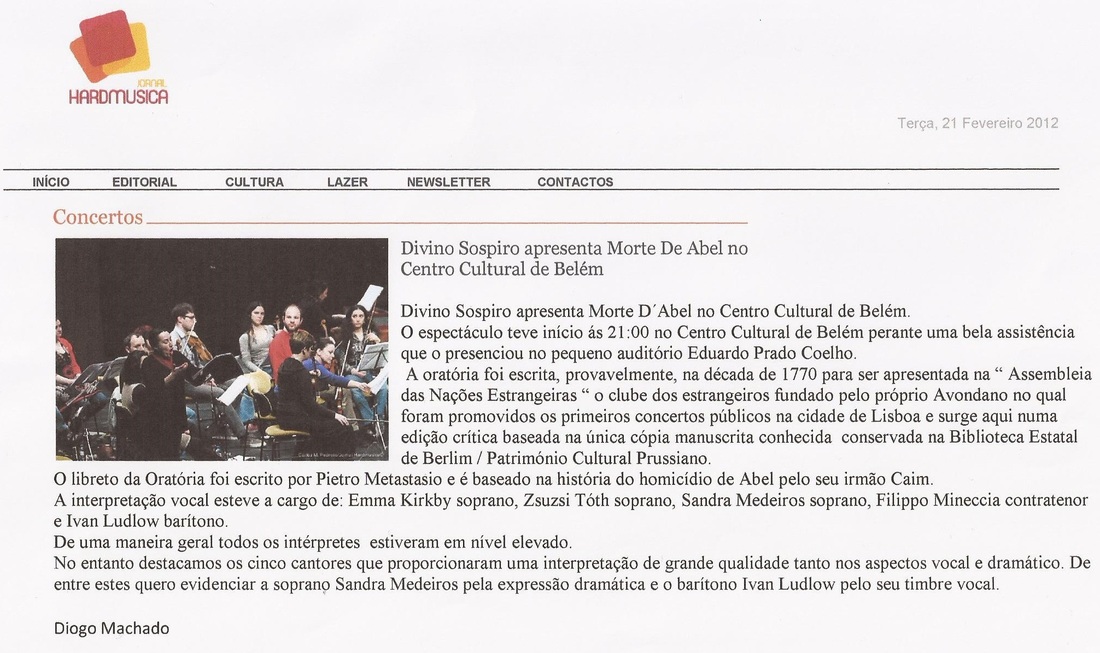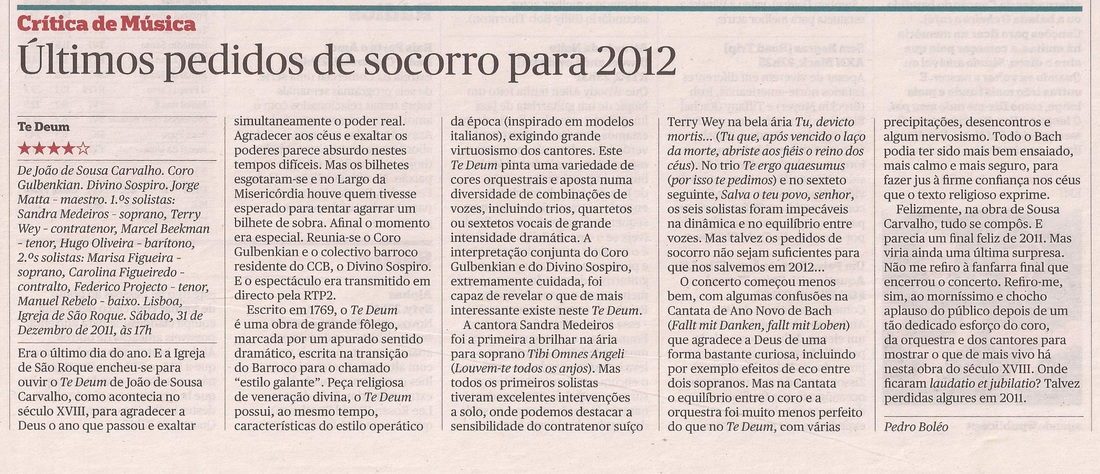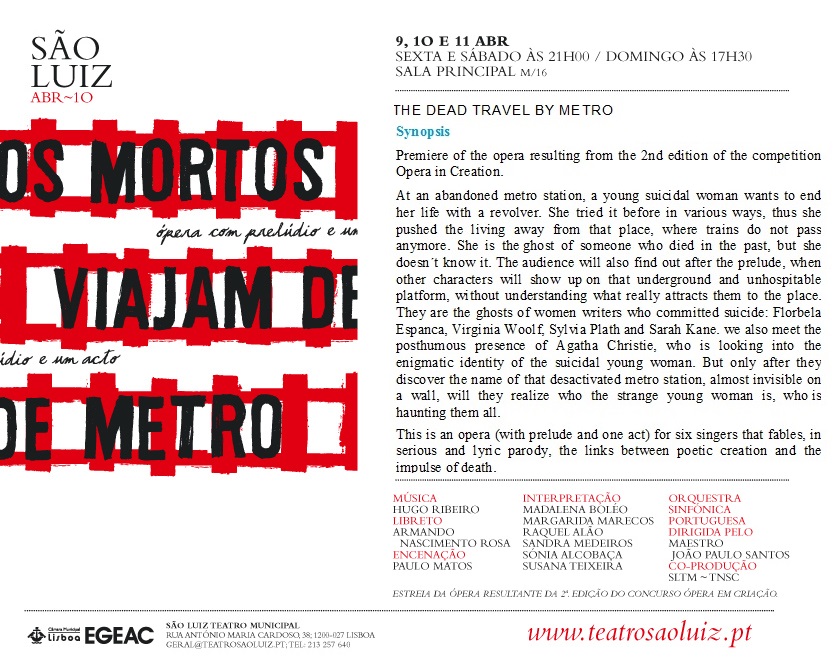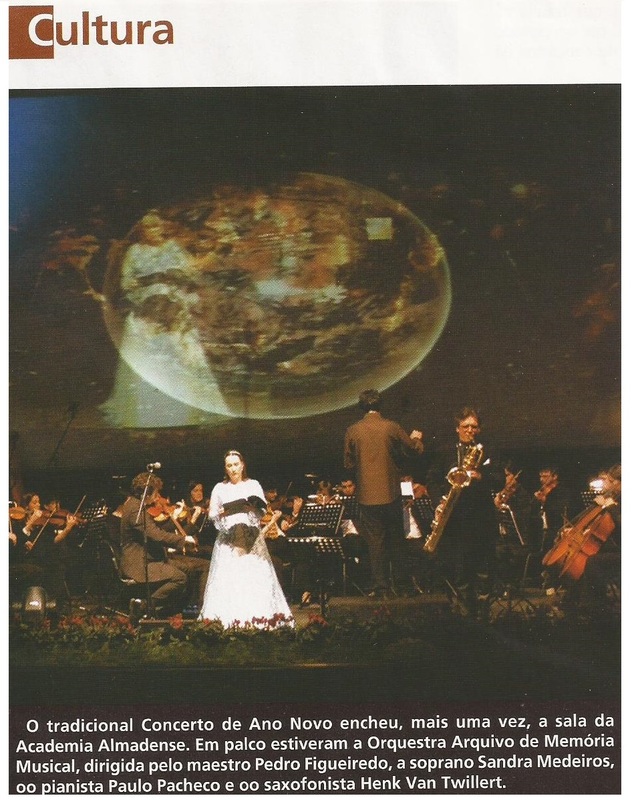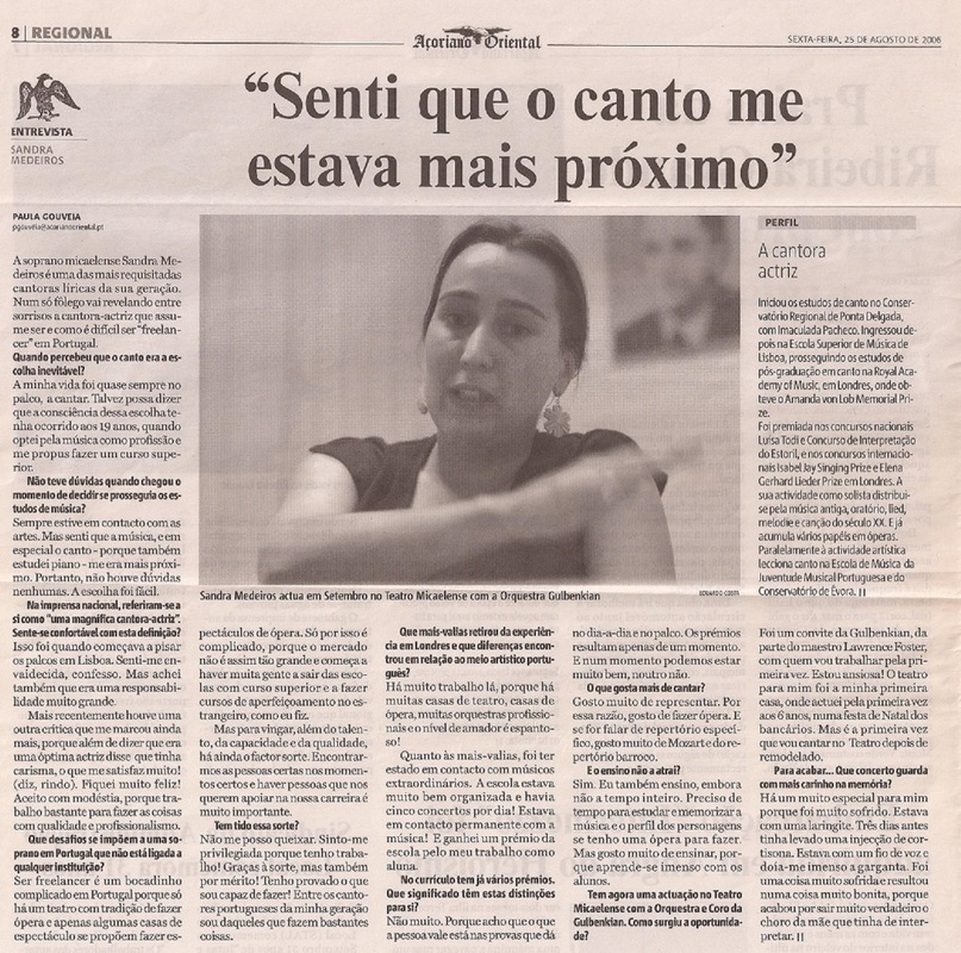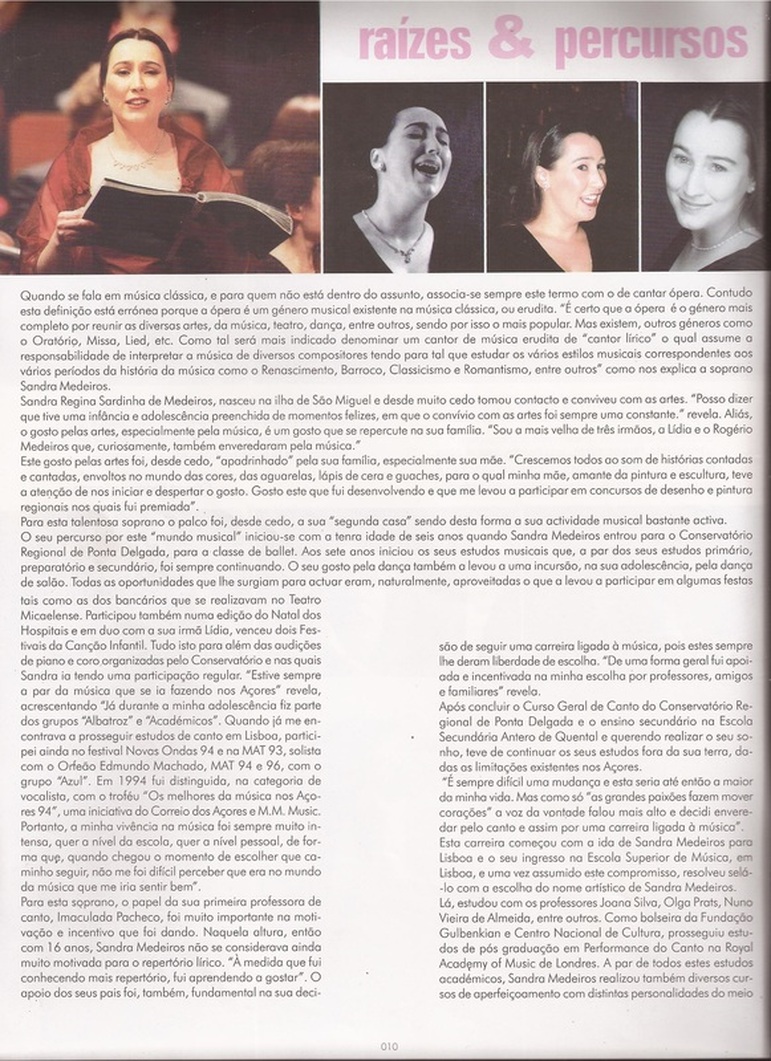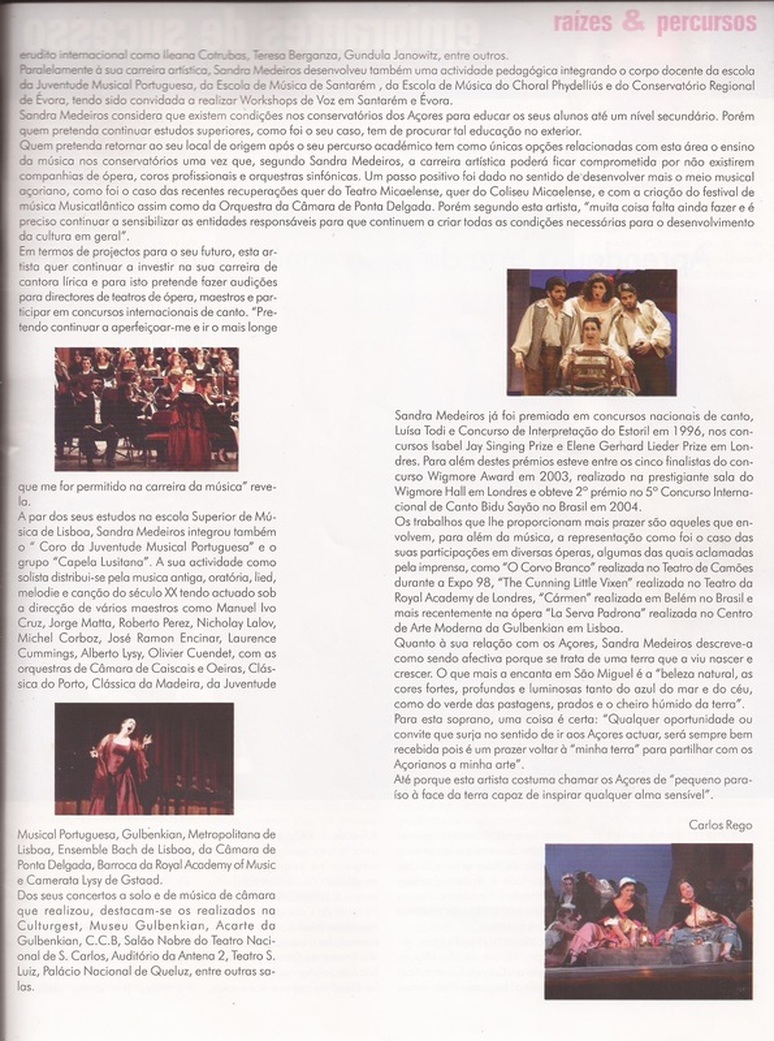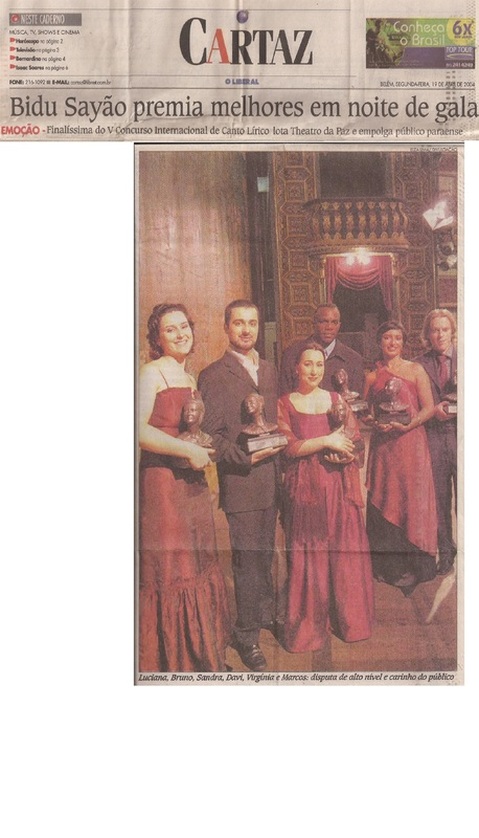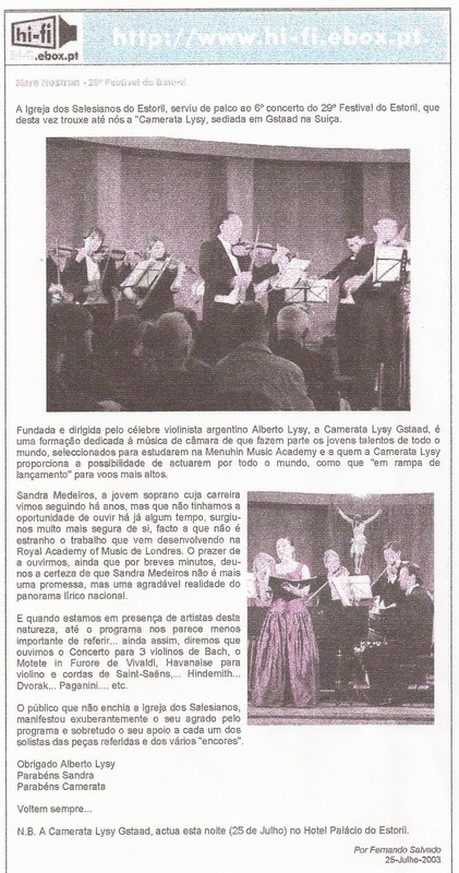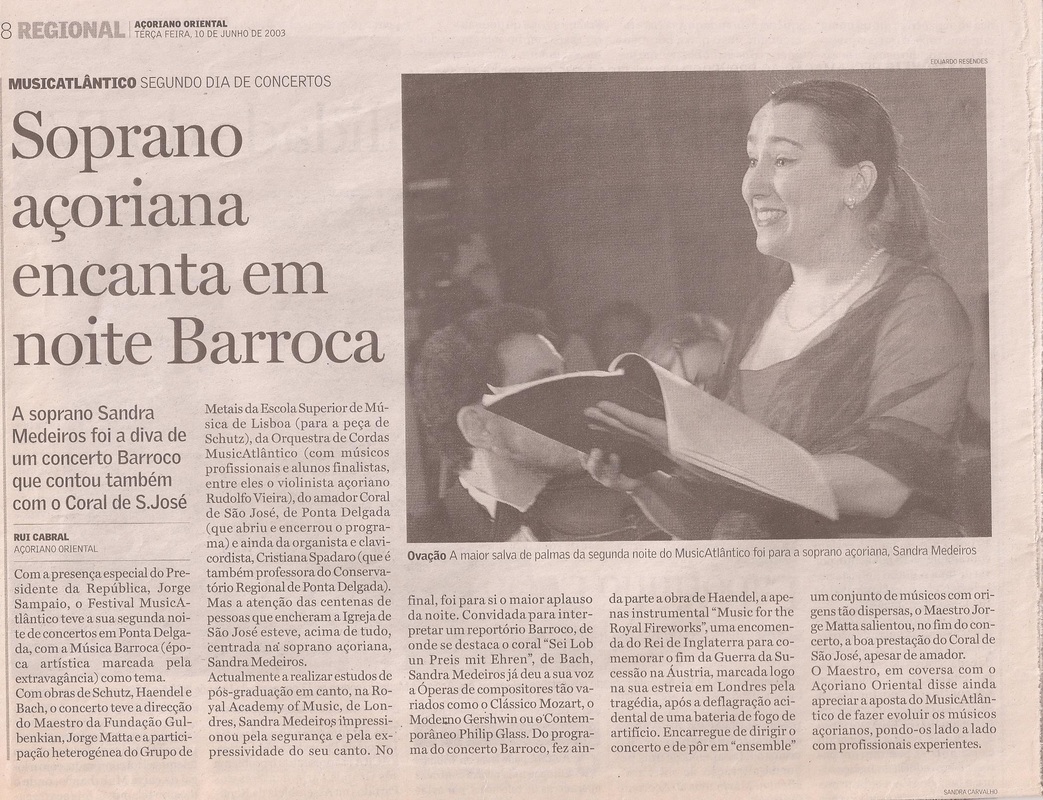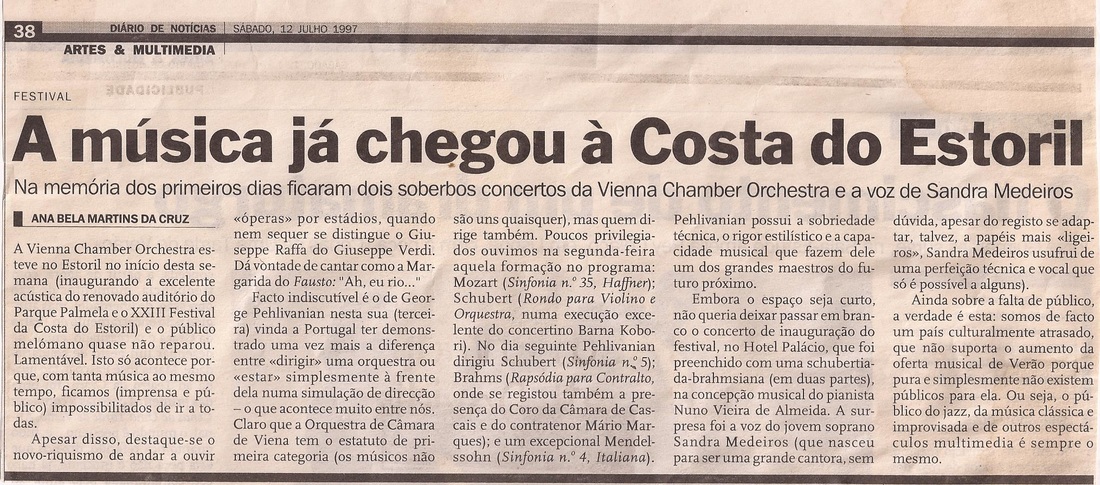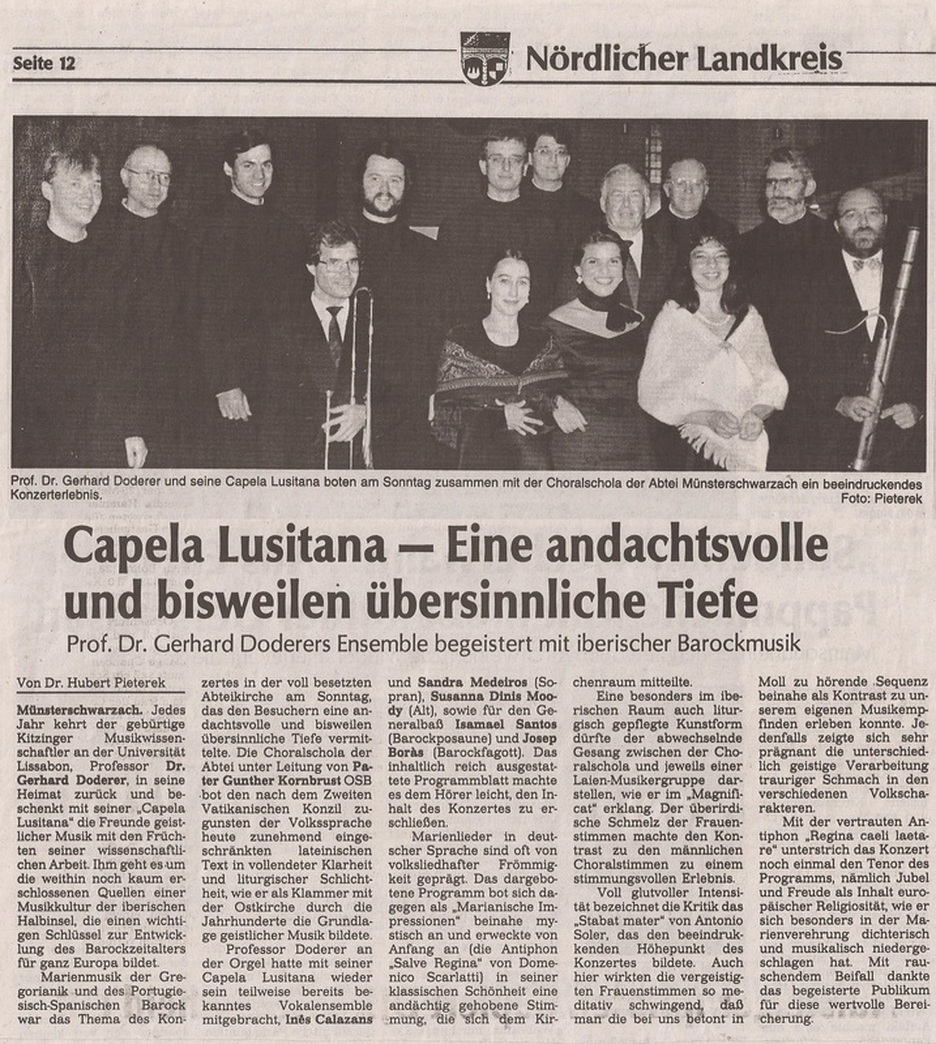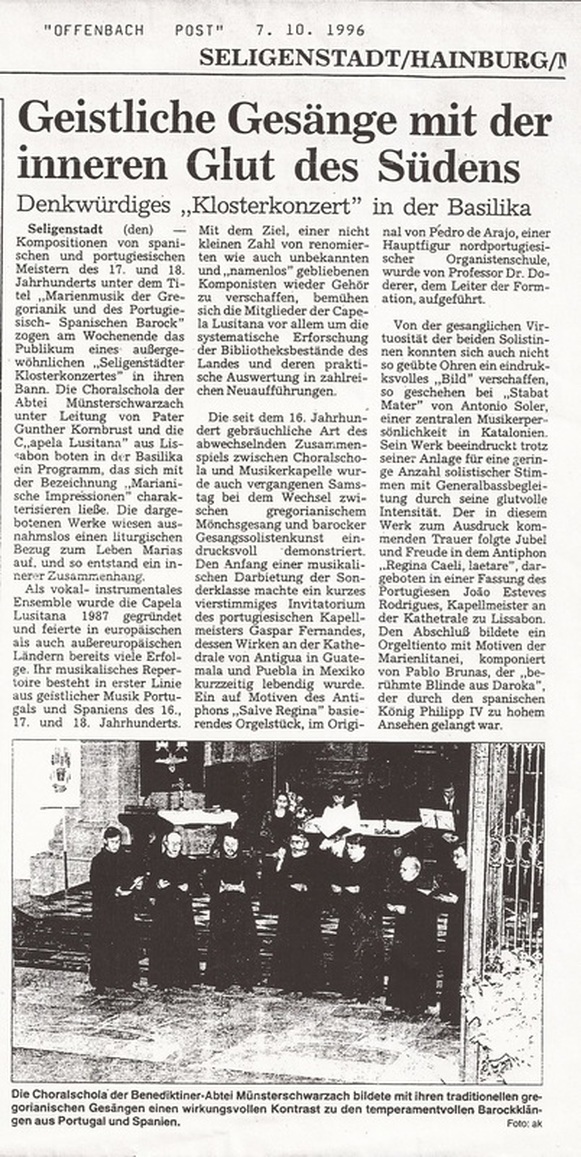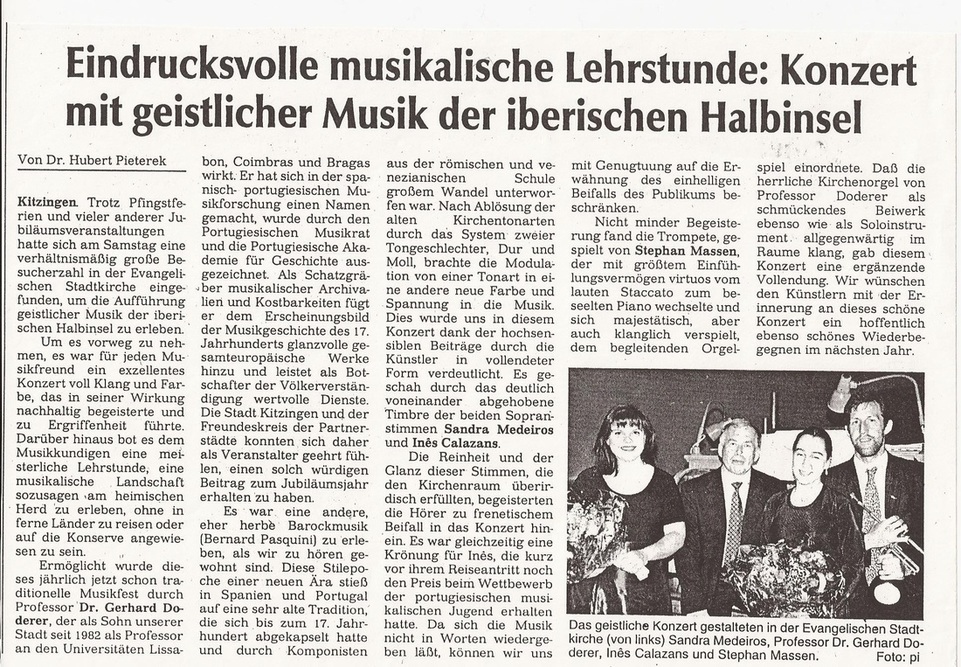PROART ENTREVISTA: A SOPRANO SANDRA MEDEIROS REVELA COMO TEM SIDO SUA TRAJETÓRIA PELO UNIVERSO MUSICAL
"We surrender to the prodigious vocal skills of the soprano Sandra Medeiros: Very expressive voice, excellent tuning, bright treble, wide volume, remarkable extension, the word well said, the phrase well characterized." in Tribuna das Ilhas (newspaper), September 2019
"The soprano Sandra Mann stood out in Tibi omnes angeli and Aeterna fac by showing musical intelligence, stylistic correction and admirable vocal agility "
in Público (newspaper), February 2019 (Manuel Pedro Ferreira)
“It is a luxury for any lover of music to hear a group with such resources. whether is for the quality of the artists, as for the originality of the instrumental formation. It is unusual to hear a "Consort" as unusual as this, which does not fit into any of the categories and includes, among its instruments, the viola da gamba with its melancholy and evocative timbre. Then, even more; if accompanied by theorbo and Baroque guitar. This trio of women, is a real rarity ... the trio played Dowland compositions found in the "first book of songs" that in the voice of Sandra Mann resulted as an unrepeatable experience. Her voice undertook sublime moments in the compositions of the Elizabethan musician...”
about recital of Affetti d'amore (Ensemble) - in blog El Gabinete de Kaligari (Francisco Collado Berrocal), November 2018
about recital of Affetti d'amore (Ensemble) - in blog El Gabinete de Kaligari (Francisco Collado Berrocal), November 2018
September 2017
"Medeiros has the best performance (...) in Il tuo pianto" CD Review (L’Angelica, Naxos) in Expresso (newspaper) by Jorge Calado, February 2017
“It is a luxury for any lover of music to hear a group with such resources. whether is for the quality of the artists, as for the originality of the instrumental formation. It is unusual to hear a "Consort" as unusual as this, which does not fit into any of the categories and includes, among its instruments, the viola da gamba with its melancholy and evocative timbre. Then, even more; if accompanied by theorbo and Baroque guitar. This trio of women, is a real rarity ... the trio played Dowland compositions found in the "first book of songs" that in the voice of Sandra Mann resulted as an unrepeatable experience. Her voice undertook sublime moments in the compositions of the Elizabethan musician...”
about recital of Affetti d'amore (Ensemble) - in blog El Gabinete de Kaligari (Francisco Collado Berrocal), December 2016
"... This return to the score, featuring Os Músicos do Tejo and outstanding singers, is commendable... The main role (Giuditta) fell to the Azorean soprano Sandra Medeiros, who fully rose to the challenge ... Combining the interpretative intensity, the technical skill and an evenly clear and precise vocal release , Sandra Medeiros took the stage with authority and delighted the audience, very religiously, with her murderous faith. In this case, it is a compliment to say that the interpreter shed blood. "in Fazer jus ao património: viva La Giuditta!, Público (newspaper), September 2016 (Manuel Pedro Ferreira)
“The performances are very good—particularly the females, who perform the music and difficult ornamentation with excellent tone and control... The sound is excellent.” CD Review (L’Angelica, Naxos) in American Record Guide Read by Elliot Fisch, September 2016
“The singing is generally very fine…An invigorating find.” CD Review (L’Angelica, Naxos) in Fanfare by Barnaby Rayfield, September 2016
“…The 5 singers are uniformly very good...The recorded sound is rich, vibrant and very naturally balanced between singers and instrumentalists. Maestro Castro’s exhaustive essay detailing the origin and development of this genre is mandatory reading. Let’s hope that more of the 36 Serenatas attributed to Carvalho can be resurrected with the same degree of care and enthusiasm as exhibited here.” CD Review (L’Angelica, Naxos) by Allen Cohenon, July 2016
“... The soprano Sandra Medeiros (Lindane) has an extremely demanding role, which she plays with vigor and precision..." in Público (newspaper), May 2016 (Manuel Pedro Ferreira)
“Naxos continue on a journey of musical discovery, this ‘courtly serenata’ from the Portuguese composer, João de Sousa Carvalho, one of its most significant…A remarkable find, and I beg all lovers of Baroque opera to hear it.” CD Review (L’Angelica, Naxos) David’s Review Corner by David Denton, April 2016
"... The timbre of this agile and very expressive soprano wonderfully suits the chosen repertoire, and shines the most, I must say, on the Italian text. Nevertheless, "She never told her love" was, to me, the most thrilling interpretation of the evening. Although it did not require as much vocal ability as the other pieces, it was full of a magnificent expressive richness, the result not only of the excellent vocal and musical technique, but also of Sandra Medeiros’s dramatic side, she who takes each piece to its end in a consistent and devoted manner, starting with the in-breathing before the first note is ever heard." in Glosas, November 2015 (Helena Lopes Braga)
"... The timbre of this agile and very expressive soprano wonderfully suits the chosen repertoire, and shines the most, I must say, on the Italian text. Nevertheless, "She never told her love" was, to me, the most thrilling interpretation of the evening. Although it did not require as much vocal ability as the other pieces, it was full of a magnificent expressive richness, the result not only of the excellent vocal and musical technique, but also of Sandra Medeiros’s dramatic side, she who takes each piece to its end in a consistent and devoted manner, starting with the in-breathing before the first note is ever heard." in Glosas, November 2015 (Helena Lopes Braga)
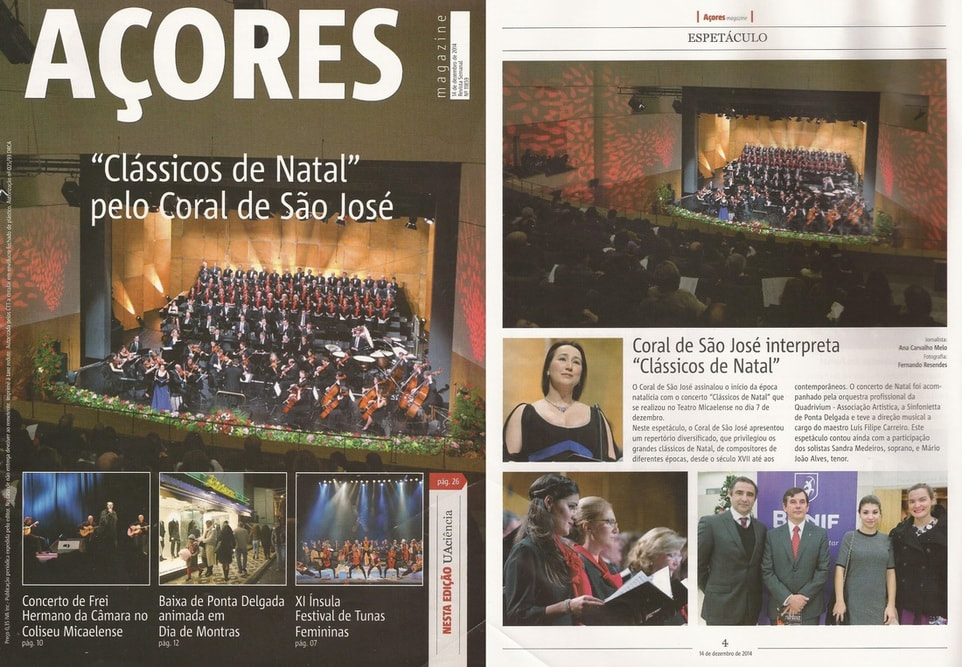
“After last year’s great success, L’Avventura returned in triumph to Brighton this evening, delighting an even bigger audience with a Christmassy flavour to their programme of African and Brazilian music. The excellent quartet of Portuguese singers delivered an exciting, full-bodied sound. The musical monks of the monastery of Santa Cruz at Coimbra must have been a jolly lot if this concert represents their style. Even the serious religious numbers, enriched with the philosophy of St Augustine, had more than a hint of the dance which just bubbled up from the ever supportive accompaniments. It made for a really joyful concert!” in thelatest.co.uk by Andrew Connal (Trade Routes-L’Avventura London at St. George’s Church), November 2014
“The interpretation of Concerto Campestre was an example of a refined work (...) And it was lucky to have included a set of very good quality soloists. (...) As secondary characters, Luísa Tavares and Sandra Medeiros (the "pastoral" lovers Tirsi and Licori) were very good.” in Público (newspaper), October 2014
"The most serious role in the vocal plan of Flaminia, counted on the virtuosity and agility of Sandra Medeiros" in Público (newspaper), July 2014
"Then came Mozart’s 'Exultate Jubilabe', where we exulted and rejoiced with the beautiful and powerful voice of the soprano Sandra Medeiros: she shone abundantly" in Cyberjournal, edition of 28-03-2014
“L’Avventura made some friends in Brighton this evening, many of them. The cabaret setting, tables, drinks and informality successfully disguised the high quality of director Žak Osmo’s scholarship and the stylistic purity of the performances. 18th Century Portuguese ‘modinhas’, with a touch of Brazilian rhythms, made an evening of delight. The two ebullient sopranos, Joana Seara and Sandra Medeiros, conveyed every detail of the songs perfectly, teasing, jolly or impassioned, even though I’ve no idea of the language…I hope they’ll be back here very soon!” in thelatest.co.uk by Andrew Connal (Profane Delirium-L'Avventura London at St. George’s Church), November 2013
"Músicos do Tejo showed excellent group work, with a program focused on the interventions of Sandra Medeiros (vocal flexibility and great empathy with the public)" in Correio do Minho (newspaper), July 2013
"... And the wave of the baroque universe under the direction of Marcos Magalhães ahead of Músicos do Tejo (a style lesson starring Sandra Medeiros whose smashing interpretation caused a deserved delirium in the auditorium, which hailed the way a soprano voice penetrated the intricacies of Handel’s universe)"
in Expresso (newspaper), April 2013 (Ana Rocha)
"The concert of Músicos do Tejo was dominated by the agility and vocal brilliance of the soprano Sandra Medeiros, in arias by Francisco de Almeida Pergolesi and Handel." in Público (newspaper), April 2013 (Cristina Fernandes)
"Taking the example of Shakespeare's play "The Tempest" and Purcell's opera, the only thing that remained of the original works was the " revisited " plot and some "chants” interpreted in a consistent and sublime manner by the baritone Rui Baeta and the soprano Sandra Medeiros” in Froggy's delight, April 2013
"And Purcell is masterfully sung over the successful arrangements of Xinobi et Moulinex (sic)." in Un fauteuil pour l’orchestre, April 2013
“The interpretation of Concerto Campestre was an example of a refined work (...) And it was lucky to have included a set of very good quality soloists. (...) As secondary characters, Luísa Tavares and Sandra Medeiros (the "pastoral" lovers Tirsi and Licori) were very good.” in Público (newspaper), October 2014
"The most serious role in the vocal plan of Flaminia, counted on the virtuosity and agility of Sandra Medeiros" in Público (newspaper), July 2014
"Then came Mozart’s 'Exultate Jubilabe', where we exulted and rejoiced with the beautiful and powerful voice of the soprano Sandra Medeiros: she shone abundantly" in Cyberjournal, edition of 28-03-2014
“L’Avventura made some friends in Brighton this evening, many of them. The cabaret setting, tables, drinks and informality successfully disguised the high quality of director Žak Osmo’s scholarship and the stylistic purity of the performances. 18th Century Portuguese ‘modinhas’, with a touch of Brazilian rhythms, made an evening of delight. The two ebullient sopranos, Joana Seara and Sandra Medeiros, conveyed every detail of the songs perfectly, teasing, jolly or impassioned, even though I’ve no idea of the language…I hope they’ll be back here very soon!” in thelatest.co.uk by Andrew Connal (Profane Delirium-L'Avventura London at St. George’s Church), November 2013
"Músicos do Tejo showed excellent group work, with a program focused on the interventions of Sandra Medeiros (vocal flexibility and great empathy with the public)" in Correio do Minho (newspaper), July 2013
"... And the wave of the baroque universe under the direction of Marcos Magalhães ahead of Músicos do Tejo (a style lesson starring Sandra Medeiros whose smashing interpretation caused a deserved delirium in the auditorium, which hailed the way a soprano voice penetrated the intricacies of Handel’s universe)"
in Expresso (newspaper), April 2013 (Ana Rocha)
"The concert of Músicos do Tejo was dominated by the agility and vocal brilliance of the soprano Sandra Medeiros, in arias by Francisco de Almeida Pergolesi and Handel." in Público (newspaper), April 2013 (Cristina Fernandes)
"Taking the example of Shakespeare's play "The Tempest" and Purcell's opera, the only thing that remained of the original works was the " revisited " plot and some "chants” interpreted in a consistent and sublime manner by the baritone Rui Baeta and the soprano Sandra Medeiros” in Froggy's delight, April 2013
"And Purcell is masterfully sung over the successful arrangements of Xinobi et Moulinex (sic)." in Un fauteuil pour l’orchestre, April 2013
WATCH VIDEO:
WATCH VIDEO:
"Two bewitching singers (with emphasis on Sandra Medeiros, with a liquefying timbre)" in Diapason, February 2013
"18th-century English Love Songs, now released by the British label Hyperion, is a disc entirely dedicated to modinhas (Portuguese folk songs) (...) The disc offers us more than 70 minutes of music, including modinhas and compositions of the period for keyboard (...) All with the impeccable interpretation of the Portuguese sopranos Sandra Medeiros and Joana Seara and the British group L'Avventura London, under the direction of the Bosnian lutenist resident in London Žak Ozmo. It is an unusual Portuguese record released by a British label that stands for the exceptional quality of its interpretations, its recordings and its editing. A CD that is listened to with great pleasure and curiosity. A reference in the end of 2012 that marks, undoubtedly, the big choices to be made in Portugal this new year." in Apopshop, January 2013
“Modinhas, songs of love and loss from the salons of Lisbon 200 years ago, are the forefathers of fado, the Portuguese national song-form that remains popular today. Guitarist Žak Ozmo and his instrumental group L’Avventura London are joined by two Portuguese sopranos, Sandra Medeiros and Joana Seara, and their fervent – occasionally wild – singing is perfect for the intertwining lines and suggestive harmonies of the modinhas.”
CD Review (Editor’s Choice) - Early Music Today, December 2012
“Sandra Medeiros has a vocal range no less impressive than that of her colleague, which she displayed to maximum effect in the anonymous ‘Foi por mim, foi pela sorte’, a slow harrowing meditation on the destructive effects of jealousy, and in Portugal’s ‘Já, já me vai, Marília’. In this song, the voice enters into a delicate dialogue first with the flute, seemingly lifted straight out of a Mozart opera, and eventually with the entire ensemble as different instruments seem to comment upon and add to the narrative woven by the words. Medeiros’s slightly more metallic timbre gave a haunting otherworldliness to this plaintive dirge entirely in keeping with the world-weary detachment projected by the song’s narrator. Together, Medeiros and Seara created intricate and at times highly amusing musical drama in duets like ‘Ganinha, minha Ganinha’ and ‘Você trata amore em brinco’(…) Both Medeiros and Seara ornamented their performances with a few well-placed and deliberately coquettish voice effects, highlighting the essential humour and playfulness of the more exuberant of these songs. In ‘Você trata amore em brinco’, for example, the afflicted narrator, suffering sorely under the tyranny of love, positively wallows in self-pity (the repeated line runs ‘Ai, amor, amor, amor’), a comic, almost caricaturesque, scene which was acted out with gusto by the singers – to the utter delight of the audience.” Review of Profane Deliriums: eighteenth-century Portuguese Love Songs by Tullia Giersberg, November 2012
“The diversity of the music holds your attention from start to finish, whether it is a soprano serenade with guitar-led ensemble or a lonely harpsichord plucking away in the noonday sun. Impatient listeners should skip to the second track, where they will be assaulted by duet virtuosity of a feline, Rossinian felicity. Sandra Medeiros and Joana Seara are the stunning sopranos; Žak Ozmo directs L’Avventura London. This, wrote Beckford, is ‘an original sort of music, different from any I ever heard.’ Two centuries later, that estimate still holds true.”CD of the week – Portuguese Love Songs by Norman Lebrecht
“Wonderful. When you hear this you'll wonder why most of this music has been unheard for so long. It is a fabulous disc of truly delightful pieces, highly unusual in its mixture of rhythms and syncopations, and its soulfulness and cheery brightness. It is Portuguese 'fado' and Brazilian folk mixed together but, incredibly, from the 18th century. The performances are outstanding, highlighted by the two wonderful singers who sing some of the pieces as duets. Žak Ozmo deserves a great deal of credit for researching this music and bringing it to light through his musical direction and playing.”
CD Review (18th Century Portuguese Love Songs, Hyperion) by John Graham Morgan (Dartmouth, NS), November 27, 2012
"For the modern resuscitation of this oratory, Divino Sospiro tried to surround itself by great quality singers. (...) Sandra Medeiros, in a highly demanding role, made the best use of a nervous voice, striking and virtuosic, lending Abel’s character a "terribilità" appropriate of the tragedy."
in Público (newspaper), February 2012 (Manuel Pedro Ferreira)
"In general, all interpreters performed at a high level. However, we highlight the five singers who provided an interpretation of great quality both in vocal and dramatic aspects. Among them I would like to highlight the soprano Sandra Medeiros for her dramatic expression (...) "
in Divino Sospiro apresenta Morte de Abel no Centro Cultural de Belém, Hardmusica newspaper, February 2012 (Diogo Machado)
"The singer Sandra Medeiros was the first to shine in the aria for soprano Tibi Omnes Angeli" Público, January 2012 (Pedro Boléo)
"Integrated in the Açores Temporada de Música 2010, the recital’s program of the 4th was dedicated to Portuguese art song, strongly rooted in the national folklore, namely the Azorean one. (...) Sandra Medeiros was a star, with great safety in her voice, good diction and an excellent interpretation and expression of the songs performed, adding value to all the compositions that integrated this recital. One thing is clear, the Portuguese art song may not be well known, but surely the Portuguese people should become better acquainted with the Azorean Sandra Medeiros "Geocrusoe Blog, September 2010
"... Divino Sospiro proposed the program Itália e Portugal, um barroco em paralelo (Italy and Portugal, a baroque in parallel) (...) with the Cantata A quel leggiadro volto, by Francisco António de Almeida (...) and the modern premiere of the aria Ah non sai bella Selene. (...)As it had happened before in Almeida’s Cantata, Sandra Medeiros sang it with touching expressiveness, sense of style and considerable agility" Público, June 2010 (Cristina Fernandes)
"Sandra Medeiros (Tirsi), also dazzled with her remarkable voice projection and appropriate interpretative approach, and with a great interpretation, secure and powerful." in Uma serenata de notável valor artístico- Reconquista newspaper, June 2010 (Fabião Baptista)
"The cast, competent and balanced, was completed by (...) Margarida Marecos (Virginia Woolf) and Sandra Medeiros (Sylvia Plath), where one should highlight the performances of the last two." in Cantoras mortas: Uma ópera suicidária -Público, April 2010 (Manuel Pedro Ferreira)
"... Divino Sospiro proposed the program Itália e Portugal, um barroco em paralelo (Italy and Portugal, a baroque in parallel) (...) with the Cantata A quel leggiadro volto, by Francisco António de Almeida (...) and the modern premiere of the aria Ah non sai bella Selene. (...)As it had happened before in Almeida’s Cantata, Sandra Medeiros sang it with touching expressiveness, sense of style and considerable agility" Público, June 2010 (Cristina Fernandes)
"Sandra Medeiros (Tirsi), also dazzled with her remarkable voice projection and appropriate interpretative approach, and with a great interpretation, secure and powerful." in Uma serenata de notável valor artístico- Reconquista newspaper, June 2010 (Fabião Baptista)
"The cast, competent and balanced, was completed by (...) Margarida Marecos (Virginia Woolf) and Sandra Medeiros (Sylvia Plath), where one should highlight the performances of the last two." in Cantoras mortas: Uma ópera suicidária -Público, April 2010 (Manuel Pedro Ferreira)
"The Azorean soprano Sandra Medeiros starred in one of the most beautiful moments of the night."
in Concerto de Reis com brilho, antenanove.blogspot.com/2010/01/jornal-do-meio-dia.html
"Delivering a lyrical recital completely in Portuguese, by starting with Marcos Portugal, passing through composers little known in Brazil, national musicians, venturing in arrangements of the Azorean folklore and concluding with the ballads of Francisco Lacerda, is not easy! But Sandra Medeiros absolutely managed to captivate and delight the audience. She was the master of a safe and very pleasant voice, to which she added a great expressive power. Thus, Sandra Medeiros enriched all the performed songs, while Francisco Sassetti, at the piano, knew how to properly value the music and, especially, the vocal skills. (...) Those who have the opportunity to listen to the voice of Sandra Medeiros, enjoy! " Recital de Canto e Piano - geocrusoe.blogspot.com/2008
Magazine Almada, February 2007
"... It was worth it. Sandra sings beautifully and goes beyond a stage presence graceful in every detail. Francisco, although very young, is a musician of rare sensitivity and gracefulness of touch in the most difficult nuances that a piano keyboard can allow (...) The audience was never tired to applaud the brilliant interpreters and, at that time and place, worthy ambassadors of the best music that is heard in Portugal " Festas Açorianas - Uruguay 2007 www.adiaspora.com/reportagens/fiestas4.html
"Antígona by Luis Cardoso (music) and Jorge Vaz de Carvalho (text), was distinguished by the dramatic power (reinforced by the interpretation of the soprano Sandra Medeiros ...)." in Público (newspaper), 2006
“...The Portuguese soprano, Sandra Medeiros, has a commendable achievement on her vibrant Frasquita. Owner of a beautiful and privileged voice, Medeiros is a radiant actress, charismatic and brilliant whenever on stage.”in movimento.com – Fábio de Mello 15/08/2004
"The graceful Sandra Medeiros (Frasquita) was a worthy surprise, having acted very well together with Magda Painno (Mercedes), in vocal and scenic terms (...). They both charmingly performed not only the quintet but also the reading of the cards scene." in O estado de S.Paulo (newspaper)
, 2004
“...But the greatest “star” of the concert was the soprano Sandra Medeiros, (...) she combined her beautiful tone with a firm technical dominion, including great agility in coloratura and a refined musical feeling.” in Público (newspaper), July 2003
"The soprano Sandra Medeiros was the diva of a baroque concert ... the attention of the hundreds of people who filled S. José Church was, above all, focused on the Azorean soprano (...) Sandra Medeiros impressed for the security and expressiveness of her singing. In the end, the biggest applause of the night was hers." in Açoriano Oriental (newspaper), 2003
“...and I save for the end the revelation of a magnificent actress-singer, Sandra Medeiros...she dominates masterly her crystal clear voice. Smooth and docile as a rush, Sandra controls the scenical movement and has the expressiveness only at the reach of a few...” in Diário de Notícias (newspaper), June 1997
“...the voice of the young soprano Sandra Medeiros (who was born to be a great singer...) was the greatest surprise. She is the owner of vocal and technical perfection only at the reach of a few...” in Diário de Notícias (newspaper), June 1997
Germany, 1996
Kitzinger Zeitung (Newspaper), 12th June 1995

